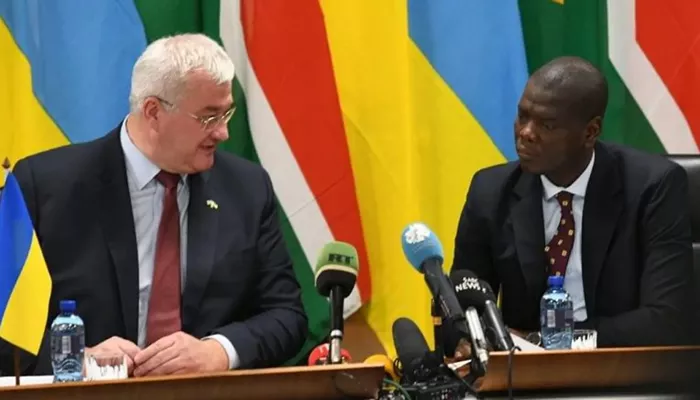A new agreement allowing Ukrainian diplomats to enter South Africa without a visa has sparked significant controversy and outrage in the country’s political landscape.
On Sunday, Leon Schreiber, South Africa’s Home Affairs Minister and a member of the opposition party, announced the agreement, referring to Ukraine as a “valued ally.” However, this announcement was met with criticism from the presidency, which stated that Schreiber did not have formal authorization from President Cyril Ramaphosa to make such a declaration.
Critics argue that the agreement undermines South Africa’s long-standing relationship with Russia, even though the country has maintained a neutral stance in the ongoing conflict in Ukraine. The African National Congress (ANC), which has governed South Africa since the end of apartheid three decades ago, has clashed with its largest coalition partner, the Democratic Alliance (DA), over the nation’s ties with Russia.
The ANC lost its majority in the May general election, compelling it to form alliances with other political parties. Recently, President Ramaphosa drew criticism from the DA after he described Russia as a “valued friend” during the Brics summit in Kazan, despite the DA’s condemnation of Russia’s actions in Ukraine.
In his announcement, Schreiber stated, “I have signed a historic agreement granting visa-free access to our country for Ukrainian holders of diplomatic, official, and service passports – and vice versa.” He justified the decision by citing Ukraine’s support of South Africa during its fight against apartheid.
The presidency responded swiftly, asserting that Schreiber’s announcement was premature, as he lacked the necessary authorization from President Ramaphosa. Vincent Magwenya, Ramaphosa’s spokesperson, remarked on X, “It is unclear how the minister can announce the signature of an international agreement without prior formal authorization.”
On Monday, International Relations Minister Ronald Lamola met with his Ukrainian counterpart, Andrii Sybiha, emphasizing that the agreement has not yet been finalized or signed. “Once all the diplomatic processes have been concluded, the agreement will be signed, and we will announce it once those processes have been followed,” Lamola stated.
The Economic Freedom Fighters (EFF), a party not part of the coalition government, condemned the agreement as a “betrayal” of South Africa’s solidarity with Russia. Additionally, the opposition party uMkhonto weSizwe (MK), led by former President Jacob Zuma, urged Ramaphosa not to proceed with the agreement. Nhlamulo Ndhlela, a spokesperson for MK, told local media, “The agreement with Ukraine is aimed at facilitating an influx and quasi-evacuation of defeated right-wing Ukrainians to South Africa by the racist pro-white imperialist DA.”
Related topics:
- Unlocking Your American Dream: How the US EB-5 Visa Can Lead You to a Green Card and Permanent Residency
- US Plans to Add 1 Million Visa Slots in 2025, Potentially Easing Travel Wait Times for Indians
- Armenia Kicks Off First Working Group Meeting on EU Visa Liberalization


